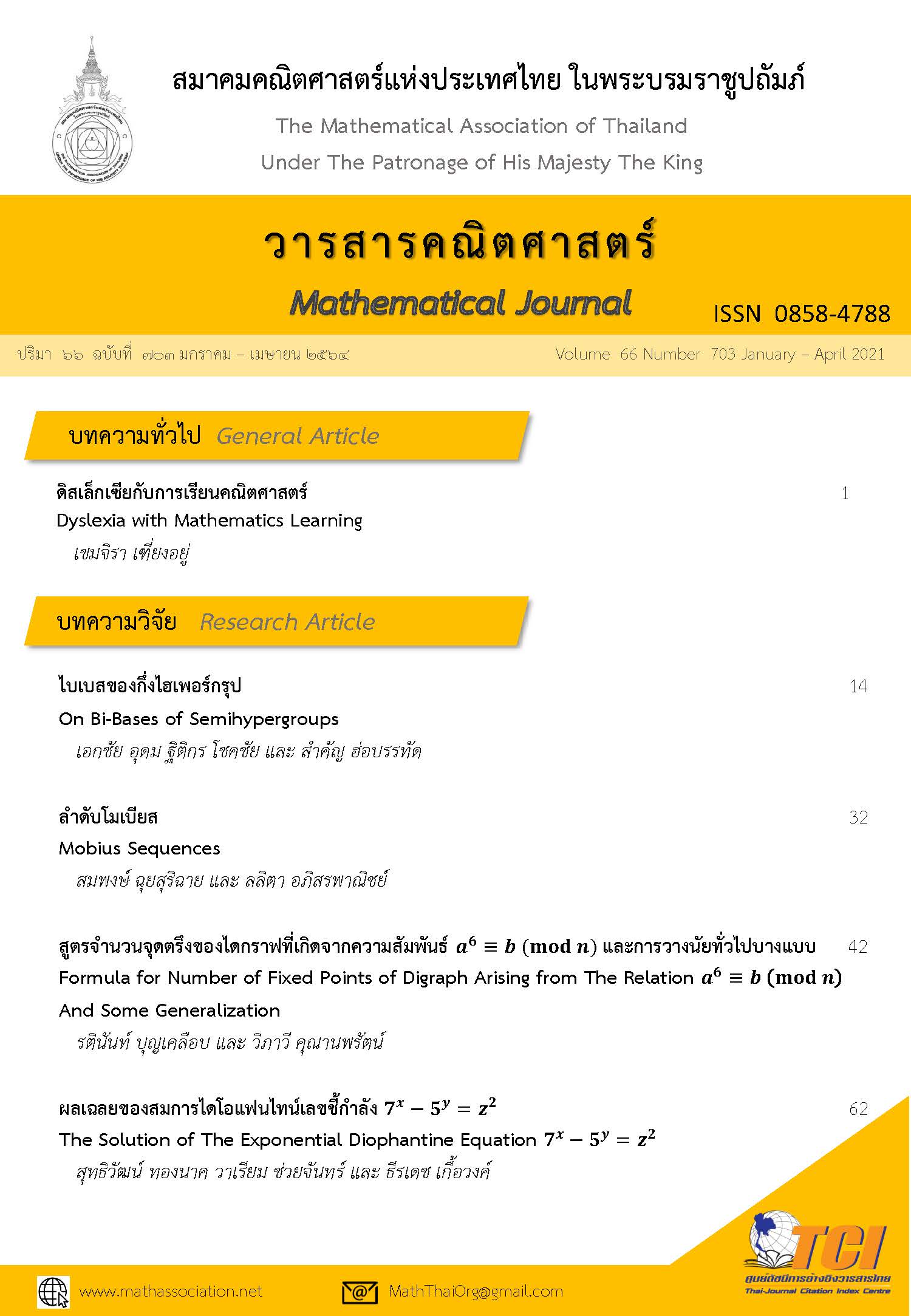The Solution of The Exponential Diophantine Equation 7^x - 5^y = z^2
Main Article Content
Abstract
In this paper, we prove that the exponential Diophantine equation has one solution where
and
are non-negative integers. In the proof, we apply reasonably Catalan’s conjecture and various theories concerning the congruence to obtain the solution. The result reveals that the unique solution is
.
Article Details
References
Acu, D. (2007). On A Diophantine Equation 2^x + 5^y = z^2. General Mathematics, 4, p. 145 - 148.
Asthana, S., and Singh, M. M. (2017). On The Diophantine Equation 3^x + 13^y = z^2. International Journal of Pure and Applied Mathematics, 114, p. 301 - 304.
Catalan, E. (1844). Note Extraite Dune Lettre Adressee a Lediteur. Journal für die Reine and Angewandte Mathematik, 27, p. 192.
Cheenchan, I., Phona, S., Ponggan, J., Tanakan, S., and Boonthiem, S. (2016). On The Diophantine Equation p^x + 5^y = z^2. SNRU Journal of Science and Technology, 8, p. 146 - 148.
Chotchaisthit, S. (2012). On The Diophantine Equation 4^x + p^y = z^2 Where p is A Prime Number. American Journal Mathematics and Sciences, 1, p. 191 - 193.
Jayakumar, P., and Shankarakalidoss, G. (2017). More on The Diophantine Equation 47^x + 2^y = z^2. International Jouranal of Innovative Research in Science and Technology, 3, p. 82 - 85.
Khan, Md. A., Rashid, A., and Uddin, Md. S. (2016). Non-Negative Integer Solutions of Two Diophantine Equations 2^x + 9^y = z^2 and 5^x + 9^y = z^2. Journal of Applied Mathemtics and Physics, 4, p. 762 - 765.
Kumar, S., Gupta, S., and Kishan, H. (2018). On The Non-Linear Diophantine Equation 61^x + 67^y = z^2 and 67^x + 73^y = z^2. Annals of Pure and Applied Mathematics, 18 (1), p. 91 - 94.
Laipaporn, K., Wananiyakul, S., & Khachorncharoenkul, P. (2019). On The Diophantine Equation 3^x + p5^y = z^2. Walailak Journal of Science and Technology, 16 (9), p. 647 - 653.
Makate, N., Srimud, K., Warong, A., and Supjaroen, W. (2019). On The Diophantine Equation 8^x + 61^y = z^2 and 8^x + 67^y = z^2. Mathematical Journal by The Mathematical Association of Thailand Under The Patronage of His Majesty the King, 64 (697), p. 24 - 29.
Mihailescu, P. (2004). Primary Cycolotomic Units and A Proof of Catalan’s Conjecture. Journal für die Reine and Angewandte Mathematik , 27, p. 167 - 195.
Peker, B. and Cenberci, S. (2012). Solutions of The Diophantine Equation 8^x + 19^y = z^2. Selcuk Journal of Applied Mathematics, 2, p. 31 - 34.
Qi, L., and Li, X. (2015). The Diophantine Equation 8^x + p^y = z^2. The Scientific World Journal (online), 22, 2015.
Rabago, J. F. T. (2013). More on Diophantine Equation of Type p^x + q^y = z^2. International Journal of Mathematics and Scientific Computing, 3, p. 15 - 16.
Sroysang, B. (2012). On The Diophantine Equation 3^x + 5^y = z^2. International Journal of Pure and Applied Mathematics, 81, p. 605 - 608.
Sroysang, B. (2012). On The Diophantine Equation 31^x + 32^y = z^2. International Journal of Pure and Applied Mathematics, 81, p. 609 - 612.
Sroysang, B. (2013). On The Diophantine Equation 7^x + 8^y = z^2. International Journal of Pure and Applied Mathematics, 84, p. 111 - 114.
Sroysang, B. (2013). On The Diophantine Equation 23^x + 32^y = z^2. International Journal of Pure and Applied Mathematics, 84, p. 231 - 234.
Sroysang, B. (2014). On The Diophantine Equation 8^x + 13^y = z^2. International Journal of Pure and Applied Mathematics, 90, p.69-72.
Sroysang, B. (2014). On The Diophantine Equation 5^x + 43^y = z^2. International Journal of Pure and Applied Mathematics, 91, p. 537 - 540.
Suvarnamani, A., Singta, A., and Chotchaisthit, S. (2011). On Two Diophantine Equations 4^x + 7^y = z^2 and 4^x + 11^y = z^2. Science and Thechology RMUTT Journal, 1, p. 25 - 28.


